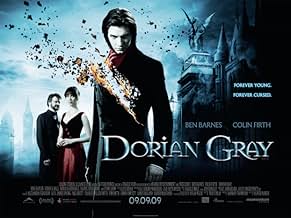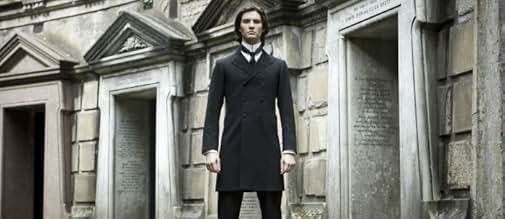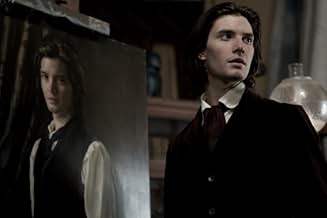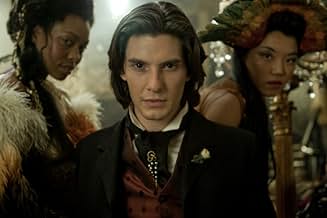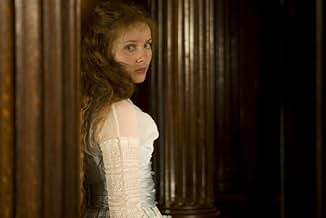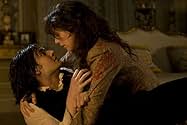IMDb रेटिंग
6.2/10
70 हज़ार
आपकी रेटिंग
अपनी भाषा में प्लॉट जोड़ेंA corrupt young man somehow keeps his youthful beauty eternally, but a special painting gradually reveals his inner ugliness to all.A corrupt young man somehow keeps his youthful beauty eternally, but a special painting gradually reveals his inner ugliness to all.A corrupt young man somehow keeps his youthful beauty eternally, but a special painting gradually reveals his inner ugliness to all.
- पुरस्कार
- कुल 1 नामांकन
Jeff Lipman
- Lord Kelso
- (as Jeffrey Lipman Snr)
फ़ीचर्ड समीक्षाएं
The darkly amoral Oscar Wilde novel "The Picture of Dorian Gray" is one of my favourites and naturally lends itself to both theatrical and cinematic dramatisations with its gripping story-line and sharply-drawn characters. This latest adaptation takes some liberties with the story-line in giving a possible reason for Dorian Gray's headlong dive into hedonism in the form of a bullying father who locked and beat his young self in the attic where he's forced to hide the offending portrait, introduces Henry Wotton's daughter as a love interest and moves the action on in time to the First World War, although the source is so strong, I don't think it needs embellishment.
The Gothic element in the story is frankly maxed out as Doran descends the slippery slope to corruption, in short order corrupting a young actress who falls in love with him, deflowering a young virgin at her coming-out ball (and her mother too!) indulge in a homosexual act with his artist friend, before bottoming out with outright murder. These scenes are lurid in their depiction and justifiable I suppose in demonstrating the levels of depravity Doran Gray has sunk to. Less convincing for me in particular were the back- story of his troubled childhood as it weakened the influence on his character of the Machiavellian all-talk-no-action Henry Wooton character plus I think the action should have been contained within the Late Victorian London era, even allowing for Dorian's ageing.
All the British cast acquit themselves admirable, Ben Barnes very good as the eternally young devil-may-care Dorian, Ben Chaplin, fine as the doomed artist Basil and especially Colin Firth as Wooton, who initially inspires and encourages Dorian's increasingly heartless actions but who realises in the end the monster behind the facade that he as helped foster.
The key climactic scene where Dorian confronts his own self-image is excitingly done and indeed the film plays like a thriller in terms of pace.
In general though I think the director placed too many logs on the fire and sacrificed narrative flow and character motive in so doing, but at least the film was exciting and always trying to move forward, the London exteriors of the 1890 in particular
The Gothic element in the story is frankly maxed out as Doran descends the slippery slope to corruption, in short order corrupting a young actress who falls in love with him, deflowering a young virgin at her coming-out ball (and her mother too!) indulge in a homosexual act with his artist friend, before bottoming out with outright murder. These scenes are lurid in their depiction and justifiable I suppose in demonstrating the levels of depravity Doran Gray has sunk to. Less convincing for me in particular were the back- story of his troubled childhood as it weakened the influence on his character of the Machiavellian all-talk-no-action Henry Wooton character plus I think the action should have been contained within the Late Victorian London era, even allowing for Dorian's ageing.
All the British cast acquit themselves admirable, Ben Barnes very good as the eternally young devil-may-care Dorian, Ben Chaplin, fine as the doomed artist Basil and especially Colin Firth as Wooton, who initially inspires and encourages Dorian's increasingly heartless actions but who realises in the end the monster behind the facade that he as helped foster.
The key climactic scene where Dorian confronts his own self-image is excitingly done and indeed the film plays like a thriller in terms of pace.
In general though I think the director placed too many logs on the fire and sacrificed narrative flow and character motive in so doing, but at least the film was exciting and always trying to move forward, the London exteriors of the 1890 in particular
I liked the 1945 film very much, but have always looked forward to a newer film that could dare to delve into the excesses that Wilde could only hint at in his novel, and even the 1945 film had to change a minor few details to make it acceptable for that time.
Now, this version - while it does show more, it has far less. There is none of the wit and wisdom of the characters in the novel or the delicate beauty of Dorian, and the ending is completely changed for no good reason.
I still have to wait for the definitive film version that can (literally) flesh out the characters while still keeping the novel intact. Too much to ask?
Now, this version - while it does show more, it has far less. There is none of the wit and wisdom of the characters in the novel or the delicate beauty of Dorian, and the ending is completely changed for no good reason.
I still have to wait for the definitive film version that can (literally) flesh out the characters while still keeping the novel intact. Too much to ask?
Very good adaption with a nicely chosen cast with some fresh and familiar faces. Thought provoking about pleasure vs happiness like the themes of the namesake book it's based on. The main character's looks is important to the film and the actor delivers his change from innocence to experience to corruption pretty well.
A bit too long in the last arc. Not entirely sure about the final scene or it's contribution to the film-so the man responsible for corrupting Dorian revenges on him for bedding his daughter. Does he do any self reflection at all for his own suggestions and encouragement that led Dorian down this path? It seems to me like the film is missing this angle of development. This is an example of a missing layer of thematic complexity that prevents me from giving a higher score.
I don't recall the book that much but there might be a few innovations in this film such as the same sex scenes (since the author Oscar Wilde I believe was homosexual) and the motivation of Dorian to change and to compel him to his final act.
A bit too long in the last arc. Not entirely sure about the final scene or it's contribution to the film-so the man responsible for corrupting Dorian revenges on him for bedding his daughter. Does he do any self reflection at all for his own suggestions and encouragement that led Dorian down this path? It seems to me like the film is missing this angle of development. This is an example of a missing layer of thematic complexity that prevents me from giving a higher score.
I don't recall the book that much but there might be a few innovations in this film such as the same sex scenes (since the author Oscar Wilde I believe was homosexual) and the motivation of Dorian to change and to compel him to his final act.
I am not an expert at writing reviews, but I so strongly disagreed with the review originally posted for this movie that I had to express a counter point of view. To me, the best thing about this movie was the acting. Ben Barnes is completely riveting and I'm not some teenage girl that things he's just so cute. He had such a strong on screen presence, I almost confused him with Ben Whipshaw who did a movie called "Perfume" and both actors in each of these performances are exceptional. It's fun to watch period pieces for the set design and costumes. Again, this movie did not disappoint. I have read Oscar Wilde's story and always found Wilde to come across as a bit enamored at his own cleverness. This script flows. The dialog comes across as witty and not pompous. The script does justice to the work. It is definitely worth the time to watch.
I've been puzzled by the negative reviews i've seen for this as i really enjoyed it. It looks superb, with some excellent atmospheric Victorian locations. Ben Barnes is perfect as Dorian, good looking but not bland & still sympathetic throughout the film. The character of Emily which has been invented for the film works very well, and Colin Firth is magnificent in his pivotal role. Dorians gradual deprivation is well shown without heading off into exploitation and he is given real depth. His tragedy is very obvious.I must admit to not having read the original book as yet, but I do intend to now. I really enjoyed it but for its full benefit I recommend seeing it at the cinema.
क्या आपको पता है
- ट्रिवियाThe original Dorian Gray has blond curly hair and blue eyes.
- गूफ़When Dorian is fighting Jim in the train station tunnel, the sleepers and spikes are visible. The spikes seen were not in use in 1890 when the novel was written, nor the era when the film is set.
- भाव
Lord Henry Wotton: There's no shame in pleasure. Man just wants to be happy. But society wants him to be good. And when he's good, he's rarely happy. But when he's happy, he's always good.
- क्रेज़ी क्रेडिटAt the start of the closing credits, they fade in and out, alternating with images of the Portrait peeking through, as though it is trying to assert itself.
- इसके अलावा अन्य वर्जनDuring post-production, the film was tailored for a '15' certificate in the UK. According to the BBFC, the filmmaker cuts were as follows:
- A scene in which a tea party is inter-cut with shots showing Dorian's sadomasochistic excesses was toned down to remove or reduce the more explicit moments (explicit sight of a fingernail being pulled off, explicit sight of a chest being cut with a razor in a sexual context, explicit sight of blood being sucked from a woman's breasts and sight of a restrained man being beaten).
- Additionally, a murder scene was toned down to remove the sense of dwelling on the infliction of pain and injury (reduction in the number of stabbings, removal of a blood spurt from man's neck, reduction in sight of victim choking on his blood).
- कनेक्शनFeatured in Lost in Adaptation: The Picture of Dorian Gray 2009 (2020)
टॉप पसंद
रेटिंग देने के लिए साइन-इन करें और वैयक्तिकृत सुझावों के लिए वॉचलिस्ट करें
विवरण
- रिलीज़ की तारीख़
- कंट्री ऑफ़ ओरिजिन
- आधिकारिक साइट
- भाषा
- इस रूप में भी जाना जाता है
- El retrato de Dorian Gray
- फ़िल्माने की जगहें
- उत्पादन कंपनियां
- IMDbPro पर और कंपनी क्रेडिट देखें
बॉक्स ऑफ़िस
- दुनिया भर में सकल
- $2,28,73,653
- चलने की अवधि
- 1 घं 52 मि(112 min)
- रंग
- ध्वनि मिश्रण
- पक्ष अनुपात
- 1.85 : 1
इस पेज में योगदान दें
किसी बदलाव का सुझाव दें या अनुपलब्ध कॉन्टेंट जोड़ें




